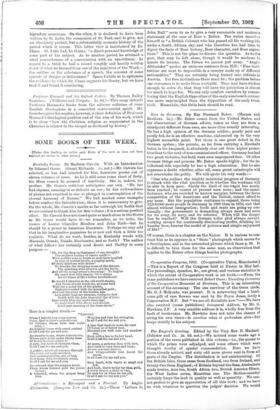Seen in Germany. By Ray Stannard Baker. (Harper and Brothers.
5s.)—Mr. Baker comes from the United States, and his observations of German affairs, taken as they are from a standpoint different from ours, are more tins usually interesting. He has a high opinion of the German soldier; poorly paid and poorly fed, he is an effective machine, elaborated up to the very highest accessible point. Yet there is one great defect in the German system ; the private, so far from carrying a Marshal's baton in his knapsack, is absolutely shut out from higher promo- tion than to the rank of non-commissioned officer. Germany has had two great victories, but both were over unprepared foes. Of other German things and persons Mr. Baker speaks highly ; for the in- tellectual side especially he has a high admiration. But he also expresses a doubt whether, after all, some great catastrophe will not overwhelm the polity. We will quote his very words :— " One who realises the mighty industrial progress of Germany is struck with the vital question as to whether the workman will be able to keep pace. Surely the limit of his wages has nearly been reached; he cannot at present earn more ; and the manu- facturers, who are crowded to narrow margins, between the fierce competition of the Americans and the British, cannot afford to pay more. But the population continues to expand, there being 12,0a0,000 more people in Germany in 1898 than in 1870, and that almost without immigration; foods and rents are going up con- tinually ; the government is demanding always more and more for its army, its navy, and its colonies. When will the danger line be reached P Will the German toiler plod always onward, working always for continually diminishing profits, drinking his Sunday beer, forever the model of patience and simple enjoyment of life ?"
Of course, there is a chapter on the Kaiser. It is curious to con- trast him as he appears in a " State " photograph which serves for a frontispiece, and in the untouched picture which faces p. 38. It is difficult to take them for the same man, an observation that applies to the Kaiser other things besides photographs.






































 Previous page
Previous page